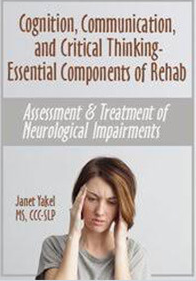[Download Now] Cognition, Communication, & Critical Thinking – Essential Components of Rehab: Assessment & Treatment of Neurological Impairments – Jane Yakel
[Download Now] Cognition, Communication, & Critical Thinking – Essential Components of Rehab: Assessment & Treatment of Neurological Impairments – Jane Yakel
[Download Now] Cognition, Communication, & Critical Thinking – Essential Components of Rehab: Assessment & Treatment of Neurological Impairments – Jane Yakel
Product Delivery: You will receive a download link via your order email immediately
Should you have any question, do not hesitate to contact us: support@nextskillup.com
Original price was: $199.99.$50.00Current price is: $50.00.
75% Off


Secure Payments
Pay with the worlds payment methods.

Discount Available
Covers payment and purchase gifts.

100% Money-Back Guarantee

Need Help?
(484) 414-5835
Share Our Wines With Your Friends & Family
Description
[Download Now] Cognition, Communication, & Critical Thinking – Essential Components of Rehab: Assessment & Treatment of Neurological Impairments – Jane Yakel
Cognition, Communication, & Critical Thinking – Essential Components of Rehab: Assessment & Treatment of Neurological Impairments – Jane Yakel
Archive: View
There are three essential components of rehabilitation.
The most common problems associated with neurological insults are attention, memory, and executive functions. Neurological impairments affect one’s ability to learn, they can limit social interactions, and they affect one’s overall quality of life. A person is affected by a full spectrum of neurological impairments. Understanding the processes underlying cognitive-communication impairments is crucial since patients are diverse in etiology, pathology, and functional abilities. Learning to think critically when developing effective intervention techniques is important for successful outcomes.
The program is rich with case studies and interactive learning and offers a neuroscience model used to guide intervention. Jane will provide you with innovative and evidence-based approaches to therapy and intervention techniques focusing on the three key domains of cognitive communication: attention, memory, and executive function. The models of memory will be discussed in relation to areas of cognitive breakdown. You can enhance your practice with intervention strategies that can be applied immediately to your current case.
- Outline specific types of attention deficits and discuss successful therapeutic interventions to assure effective outcomes
- Describe the models of care for cognitive rehabilitation with respect to specific diagnoses and rehabilitation settings
- Distinguish between memory systems and identify appropriate intervention techniques for specific patient diagnoses
- Explain executive functions and identify the most effective intervention strategies for specific targeted behaviors
- List specific techniques and strategies to maximize brain function and prevent further cognitive decline
- Implement critical thinking and problem solving skills to develop highly individualized therapeutic interventions
Communication disorders are related to the brain.
- Developing a critical thinking approach to therapeutic intervention
- Full spectrum of neurological disorders
The patient assessmentMENTS are comprehensIVE.
- Philosophy
- Dynamic Assessments
- Person-Centered Assessment
- Model
- Procedures
- Ethics and Professionalism
The heart of it all should be uppermost in your mind.
- Attention systems and behavioral deficits
- Assessments/tests for attention deficits
- Unilateral visual neglect: Assessment and Treatment
- Treatment of attention deficits
- Case studies: Learning assessments
The root of intelligence is processing speed.
- Assessments/tests for processing speed deficits
- Treatment for processing speed deficits
There is a memory of the mind.
- Neuroscience systems of memory
- Declarative/Explicit/Conscious memory
- Non-declarative/Implicit/Unconscious memory
- Decisions for consideration for memory interventions
- Etiology: Is memory loss reversible or irreversible?
- Assessments: Screenings, Standardized, Staging, or Person-Centered?
- Approaches: Didactic, Compensatory, Functional, or Adaptive?
- Treatments
- Approaches
- Specific approaches
- Didactic
- Compensatory
- Functional-experimental
- Adaptive
- Case studies: Learning assessments
The office of the monarch is an executive function.
- Definition, development, importance: High level cognitive abilities
- Responsibilities of executive functions/frontal lobe
- Behaviors associated with frontal lobe impairments
- Assessments/tests for executive function deficits
- Treatment of targeted executive function behaviors
- Environmental interventions and strategies
- Case studies: Learning assessment
The Brain Function and Health Management needs to be maximalized.
- Memories: Worse enemies
- Prevention of normal memory loss
- Depression with neuropathology
OUR BEST COLLECTION OF COURSES AND BOOKS

![[Download Now] Cognition, Communication, & Critical Thinking – Essential Components of Rehab: Assessment & Treatment of Neurological Impairments – Jane Yakel](https://nextskillup.com/wp-content/uploads/2022/05/Cognition-Communication-amp-Critical-Thinking-Essential-Components-of-Rehab-Assessment-amp-Treatment-of-Neurological-Impairments-Jane-Yakel-imc-2.png)




Reviews
There are no reviews yet.